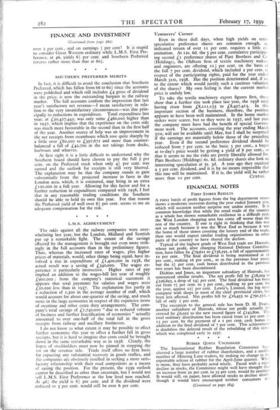FINANCIAL NOTES
FIRST STORES RESULTS
A FIRST batch of profit figures from the big department stores shows a moderate recession during the year ended January 31st, which will occasion neither surprise nor undue anxiety. It is common knowledge that while the retail trade of the country as a whole has shown remarkable resilience in a difficult year, the West London shopping area has come off worse than the rest of the country. If one is right in thinking that this was not so much because it was the West End as because it was the home of those stores covering the luxury end of the trade, then one would expect similar trading organisations in other parts of the country to have shared the decline.
Typical of the highest grade of West End trade are Harrods, whose net profit, after charging National Defence Contribu- tion, have fallen by £79,611 to £738,191, a fall of approximately to per cent. The final dividend is being maintained at II per cent., making 16 per cent., as in the previous four years, but the 21 per cent. cash bonus distributed in the previous two years has been discontinued.
Dickins and Jones, an important subsidiary of Harrods, has announced similar results. The net profit fell by £18,204 to £1o6,893, a drop of 141 per cent. The final dividend has been cut from 71 per cent. to 5 per cent., making to per cent. for the year, against 121 per cent. Lewis's, Limited, the big store company with shops in most of the chief provincial cities, has been less affected. Net profits fell by £16,453 to £791,553, a fall of only 2 per cent.
The exception to the general rule has been D. H. Evans, another subsidiary of Harrods, whose net profit actually in- creased by £6,022 to the new record figure of L143,8o0. The total ordinary distribution has been raised from 12 per cent. to 13 per cent. by the payment of a t per cent. cash bonus in addition to the final dividend of 7 per cent. This achievement is doubtless the delayed result of the rebuilding of this store. which was completed early in 1937.










































 Previous page
Previous page